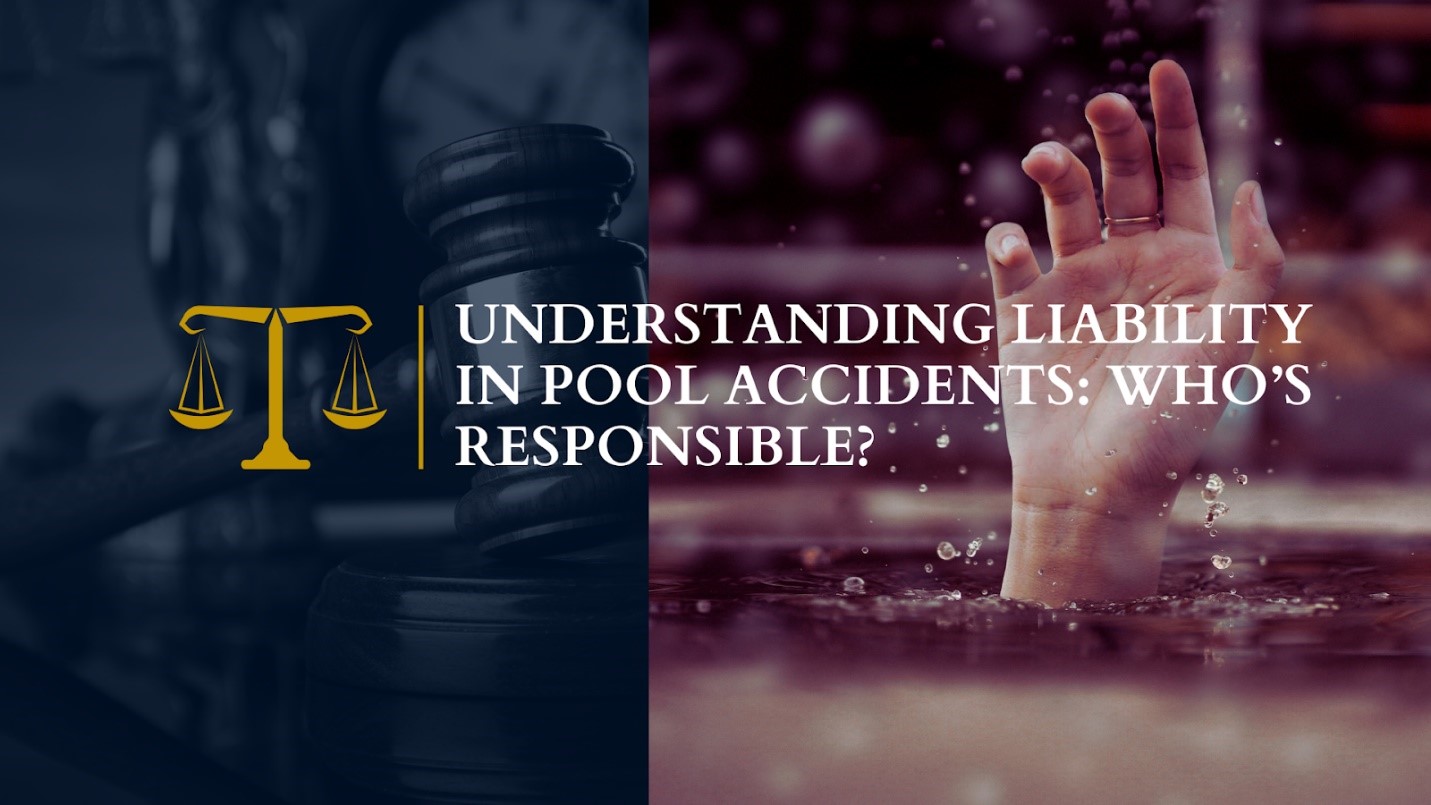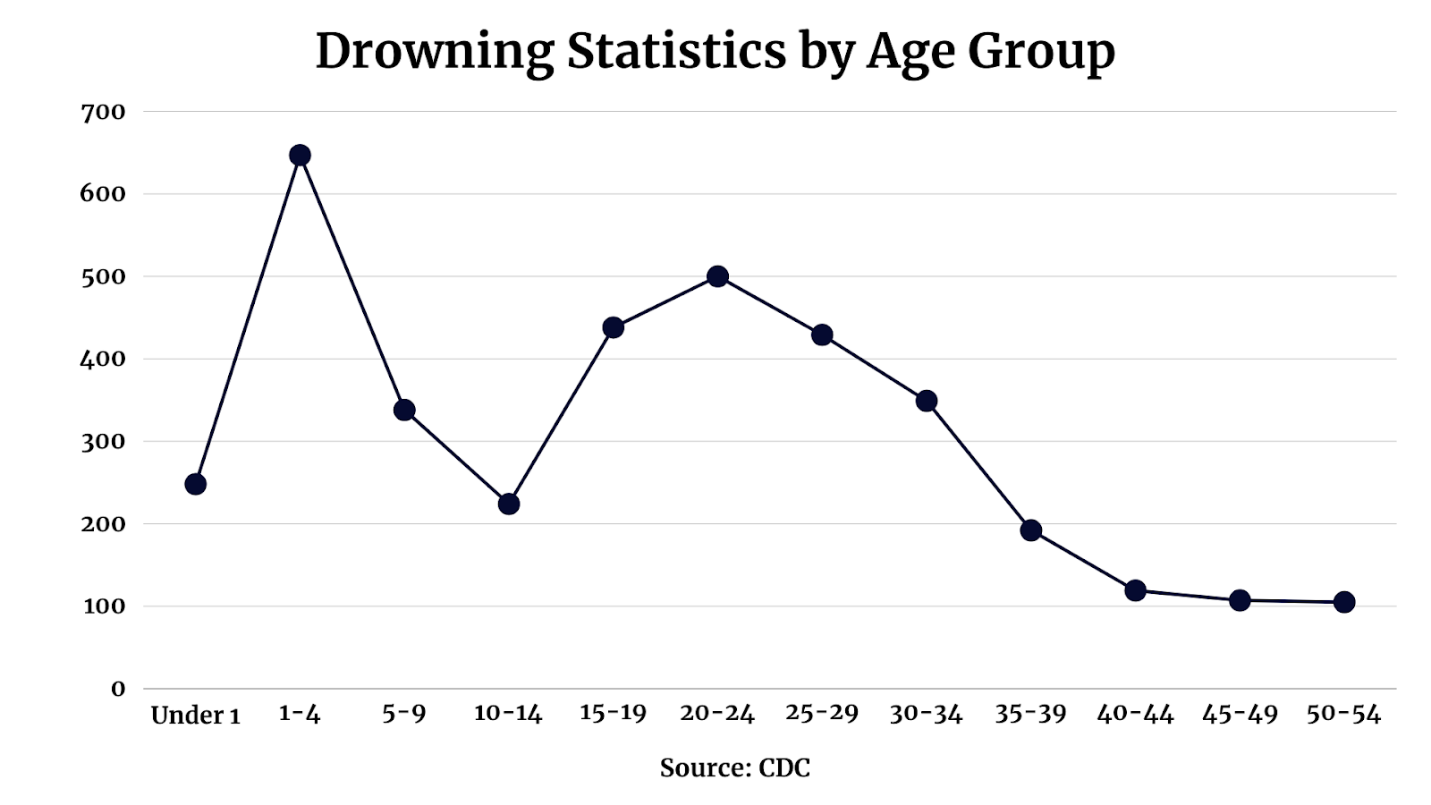Understanding Liability in Pool Accidents: Who’s Responsible?
Summers are meant for fun in the sun and relaxing poolside. But pool accidents can quickly turn leisure time tragic. From drownings to slips and falls, injuries are all too common.
When such accidents occur, liability becomes a pivotal question. Who bears responsibility? Is it the pool owner? The operator? Or even the manufacturer of pool equipment?
With personal injury lawsuits on the rise, it is crucial to grasp the complex legal issues surrounding pool accident liability. This guide breaks it down.
Types of Pool Accidents
Pool incidents generally fall into two categories:
Drowning Incidents
Drowning is the leading cause of accidental death for children ages 1-4, with residential pools accounting for nearly 75% of drowning incidents.
Take a look at the chart below to better understand the severity of this problem.
Typical scenarios include:
- Unsupervised swimming
- Slipping and falling into the pool
- Entrapment from faulty drain covers
Pool owners and operators have a legal duty to prevent such tragedies through proper supervision, barriers, alarms, and compliance with safety codes. Otherwise, they risk bearing the liability for drowning incidents.
In popular vacation spots like Myrtle Beach, drowning incidents often occur when unsupervised children access condo or hotel pools. Hiring a personal injury attorney in Myrtle Beach can help victims and their families pursue legal action and compensation.
Slip and Fall Accidents
Wet surfaces surrounding pools are prone to slips and falls. Such accidents lead to over 8 million ER visits annually in the U.S. (2).
Causes include:
- Lack of railings or textured surfaces
- Improper drainage leading to puddles
- Failure to display “wet floor” caution signs
Property owners can be held liable if poor maintenance of the pool area directly causes injury.
Parties Potentially Liable
When determining liability, several parties may share responsibility.
Pool Owners
Pool owners have a legal duty to secure their pools and prevent foreseeable accidents. Even for residential pools, owners can face lawsuits if lax safety leads to injury or drowning.
Premises liability laws generally require homeowners to fence pools, install alarms, and post safety signs. Non-compliance can establish negligence in court.
Pool Operators
Hotels, apartments, and recreation centers with pools have added accountability. Pool operators must adhere to stringent safety, training, and supervision protocols.
For instance, failure to keep chemicals balanced or to notice a struggling swimmer could lead to negligence claims. Even with “swim at your own risk” signs, operators hold a duty of care.
Manufacturers and Maintenance Companies
Faulty pumps, drain covers, and other equipment can directly cause accidents and injury. This exposes manufacturers to product liability claims if such defects cause accidents.
Likewise, maintenance companies can be sued for negligence if improper upkeep leads to hazardous pool conditions.
Determining Liability
When investigating pool accidents, several legal factors shape liability rulings.
Key Legal Principles
- Negligence – Did any party fail to take reasonable safety precautions? Negligence must directly cause injury to warrant damages.
- Premises Liability – Property owners are liable for unaddressed hazards leading to foreseeable injuries on-site.
- Product Liability – Manufacturers face liability when a defective product directly causes injury or accident.
Factors in Rulings
Specific criteria for determining negligence and liability include:
- Adherence to federal, state, and local pool safety regulations
- Following American National Standards Institute (ANSI) protocols for barriers, entrapment avoidance, and signage
- Documented inspections, repairs, and staff training
- Witness testimony regarding supervision and alcohol policies
Violations demonstrate negligence per se, while compliance aids legal defense.
Common Defenses in Pool Injury Lawsuits
In pool injury claims, defendants have several possible defenses:
Assumption of Risk
Those voluntarily participating in pool activities may be deemed to have assumed certain inherent risks. However, unreasonable dangers cannot be waived.
Contributory Negligence
If the victim’s negligence contributed to the accident, compensation can be reduced based on shared fault. Yet compensation cannot be barred entirely.
Lack of Causation
The defendant may claim their conduct did not directly cause the accident, or that intervening factors broke the chain of causation. Must be proven.
Waivers and Liability Limitations
Many pool facilities require signed waivers from users, disclaiming liability. However, overly broad waivers may not withstand legal challenge.
Recent Legal Precedents and Verdicts
With pool injuries on the rise, courts are increasingly ruling in favor of victims in landmark cases:
- In Smith v. Pool Corp., a multi-million dollar verdict was upheld against a pool manufacturer whose defective drain cover caused severe disembowelment.
- Vincent vs. Hilton Hotels set new standards for hotel pool safety, finding the hotel chain negligent in a child drowning case.
Such cases demonstrate that pool accidents can no longer be written off as unfortunate yet unavoidable occurrences. Property owners, operators, and equipment makers share a legal duty to provide secure pools through proper design, maintenance, and diligent supervision.
The Role of Insurance Coverage
Given the potential liabilities, pool owners and operators should verify ample insurance coverage. Homeowners’ policies generally include limited liability protection.
However, due to exclusions, additional personal injury coverage may be wise for those with pools. This ensures protection in the event of drowning, entrapment, or pool chemical-related injuries.
For pool contractors, general liability insurance is a must to hedge against property damage, bodily injury claims, and lawsuits. Work with your insurer to structure optimal coverage.
Steps to Take After a Pool Accident
In the traumatic aftermath of any pool-related injury or drowning, prompt action is key:
For Victims
- Administer emergency assistance, and call 911 immediately.
- Document the accident scene thoroughly through photographs and written notes.
- Contact a personal injury attorney to preserve evidence, initiate settlement talks, and pursue legal action if warranted. An experienced lawyer understands liability laws and can maximize compensation.
For Pool Owners and Operators
- After addressing urgent medical needs, document details through photos and witness statements.
- Report the event to your insurance provider promptly. Cooperate fully with investigations.
- Work with your attorney and insurer before discussing liability. Even expressions of sorrow could be construed as an admission of guilt.
Conclusion: Prioritize Pool Safety
Pool season means summer fun for millions. But pool accidents carry lasting repercussions. Understanding legal liability empowers proactive safety.
Pool owners, community associations, and landlords must comply with fencing, barrier, and drainage mandates, post clear signage, and uphold rigorous supervision. Operators should continually inspect facilities, train staff, and balance chemicals properly.
With smart prevention, we can reduce pool injuries and enjoy safer summers. After all, pools are for making joyful memories, not tragic ones.
Frequently Asked Questions
1. Can pool owners be held liable even if they follow all regulations?
While compliance aids the legal defense, owners may still be found liable if an accident clearly results from negligence or oversight on their part. Adherence to codes alone does not guarantee exemption.
2. What should I do after a pool incident as the victim?
Immediately seek medical care if required. Document the scene thoroughly through photos and notes. Promptly consult an attorney to get an objective liability assessment and determine if a personal injury claim is justified. Preserve all evidence.
3. How do residential and public pool liability rules differ?
Laws for residential pools are typically less stringent than codes for public pools and waterparks. Yet basic liability precedents of negligence and premises liability apply uniformly. Homeowners are not exempt from ensuring guest safety.
4. What legal action can I pursue if injured by a hotel pool?
You can consult a personal injury lawyer to file a premises liability lawsuit against the hotel for unsafe conditions leading to a foreseeable accident. Shared fault and waiver implications would apply. Settlement negotiation is also an option.
Careful pool operation and ownership can prevent tragedy. This summer, be vigilant and stay safe in the water.


